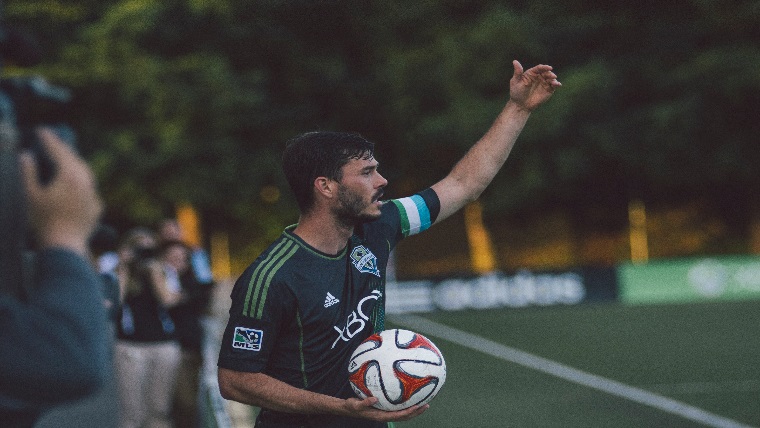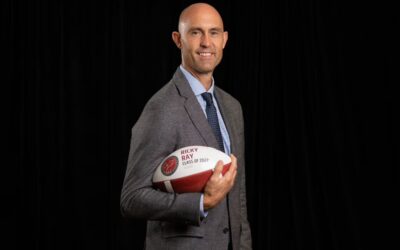“You know, we just gotta keep playing our game, putting pucks in deep and we’ll give ourselves a chance to win.” How many times has this utterly useless sound bite made its way into living rooms, bars and jumbo-trons across this continent? In fact, apply this to any professional sports league (minor and amateur sports as well, for that matter) and you’ll get the same thing. Just insert basketball court and field for ice here and you’ll get essentially an identical answer.
As a diehard sports fan, I crave interviews with athletes like Chris Pronger, which are simultaneously insightful and entertaining. However, those are harder to find than a Republican in Hollywood, especially in the NHL. However, this isn’t a woe-is-us scenario, as we are the culprits responsible for the situation. Players don’t give uninteresting interviews because they themselves are uninteresting (with the possible exception of Michael Peca, he’s got the personality of tree bark), they give boring interviews because anything else tends to land them in trouble.
Harkening back to the ’70s (just from research, I’m old, but not THAT old), players like Phil Esposito gave interviews that players now could never give. There was a rock-star persona that came with the stars of that era, the way they dressed, the way they walked and the way they talked to the media. Athletes of other leagues, especially the NBA, were even more vibrant as the ’80s rolled along. However, as technology advanced, so did the impact and access of the media. Every word uttered on camera could suddenly be played over and over again with the click of a mouse.
People unfamiliar with sports usually assume that crappy interviews are born from a lack of education. This isn’t the case, as players manage education during their junior years and some complete degrees while playing in the pros. Moreover, the training players receive for dealing with media is unbelievably extensive. It’s as though they are about to appear before a grand jury and require that their emotions are completely buried under layers of robotic staring. Every single question in a reporter’s arsenal is answered with a response that’s been uttered over a thousand times that couldn’t possibly incriminate that interviewee in the court of public opinion. Ah yes, the wonderful court of public opinion.
It is there when rational thought, carefully considered compromise and courageous conviction are automatically sentenced to a quick, yet painful, death. Players aren’t allowed to express that they don’t like something or that they think one player is better than another, because that is taken to an extreme.
Tom Brady made a comment a few weeks ago about wanting Donald Trump to become the next president of the United States. If you hear the clip, it’s clearly made in jest but because it winds up on the front page, we ravenously consume it like raccoons scything their way through a garbage bag. If you were interviewed about your classmates or coworkers, would you want a headline stating that you are unhappy with their performance? And heaven forbid athletes mention political issues or religion. If you reference God in any manner, you’re written off as a judgmental nut-job and players who criticize religion receive hate speech in return.
The most frustrating occurrence is when we label athletes as arrogant or selfish, depending on their answer. I love listening to Kobe Bryant interviews because the Black Mamba does not give a crap what anyone thinks. Sure, he probably has a massive ego and he isn’t a nice person all the time but at least he’s honest. There’s such a taboo on any absence of humility in sport. It’s kind of like saying a pilot who saves the lives of his passengers during a plane crash is only a hero by saying he isn’t a hero. Don’t misunderstand me, humility is an important and admirable trait in human beings. Being able to win with class is unfortunately rare and is an important example to set for young people watching. But just because somebody over-celebrates a goal once in a while doesn’t mean they are raging me-monsters.
That’s what has attracted so many people to Don Cherry and other former athletes-turned-analysts, like Charles Barkley and Gregg Zaun. Heck, that’s why Donald Trump continues to receive more and more support in the polls for Republican presidential candidates (really though, how close are we to the bombshell where he finally offends literally everyone on earth?). However, players don’t get the same support for honesty. Richard Sherman is an angry black man just because he got fired up about beating a guy he didn’t like? PK Subban is unsportsmanlike simply because he … wait, maybe this is a race thing …
Anyone who’s watched Cabbie Presents knows there are people in professional sports that are funny, smart and interesting to listen to. Sydney Crosby is one of those guys; listen to any journalist in the NHL talk about him and they all say that he’s a very interesting guy to talk to off the record. But until the media stops misrepresenting what they say and we stop getting outraged over it so quickly, athletes will continue to give clichéd, zombified postgame answers.
Josh Ryan
Sports Editor





